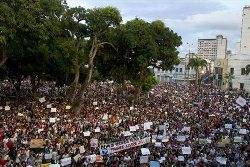About 150,000 anti-government demonstrators have taken to the streets in several Brazilian cities in opposition to bad public transport and healthcare, corruption and the billions of dollars of spending on World Cup preparation.
Police and protesters clashed in several isolated incidents on Saturday.
In Belo Horizonte, police used tear gas and rubber bullets to disperse protesters who tried to pass through a barrier and hurled rocks at a car dealership. Salvador also saw protests turn violent.
Calls to protest have also spilled over into social media, with a deluge of tweets, Facebook comments and thousands of pictures posted on Instagram.
Anger over political corruption has emerged as the unifying issue for the demonstrators, who pledged to stay in the streets until concrete steps are taken to reform the political system.
The wave of protests began as opposition to transportation fare hikes, then became a laundry list of causes including anger at high taxes, poor services and high World Cup spending, before coalescing around the issue of rampant government corruption.
They have become the largest public demonstrations Latin America's biggest nation has seen in two decades.
Protest hotspots
Police estimate that about 60,000 demonstrators gathered on Saturday in a central square in the city of Belo Horizonte, 30,000 shut down a main business avenue in Sao Paulo, and another 30,000 gathered in the city in southern Brazil where a nightclub fire killed over 240 mostly university students, deaths many argued could have been avoided with better government oversight of fire laws.
Thousands more protested in several other Brazilian cities.
In the northeastern city of Salvador, where Brazil's national football team played Italy and won 4-2 in a Confederations Cup match, about 5,000 protesters gathered about 5km from the stadium, shouting demands for better schools and transportation and denouncing heavy spending on next year's World Cup.
They blocked a main road and clashed with riot police who moved in to clear the street.
Protesters said police used rubber bullets and even tossed tear gas canisters from a helicopter hovering overhead. The protesters scattered and fled to a nearby shopping mall, where they tried to take shelter in an underground parking garage.
At the height of the protests, up to one million anti-government demonstrators took to the streets nationwide on Thursday night with grievances ranging from public services to the billions of dollars spent preparing for international sports events.
Reforms promised
The protests are continuing despite President Dilma Rousseff's televised speech on Friday in which she called for an end to the almost two weeks of protests.
Rousseff pledged a series of reforms, including stamping out corruption and invest oil revenues in education, after saying that dialogue needed to be established.
She also said that her government would create a national plan for public transportation in cities - an increase in bus and subway fares in many cities was the original complaint of the protests.
Protesters have also been denouncing legislation, known as PEC 37, that would limit the power of federal prosecutors to investigate crimes - which many fear would hinder attempts to jail corrupt politicians.
Federal prosecutors were behind the investigation into the biggest corruption case in Brazil's history, the so-called mensalao cash-for-votes scheme that came to light in 2005 and involved top aides of former President Luiz Inacio Lula da Silva buying off members of congress to vote for their legislation.
Last year, the supreme court condemned two dozen people in connection to the case, which was hailed as a watershed moment in Brazil's fight against corruption.
However, those condemned have yet to be jailed because of appeals, a delay that has enraged Brazilians.
PHOTO CAPTION
Demonstrators participate in one of many protests around Brazil's major cities in Belem, at the mouth of the Amazon River, June 20, 2013.
Al-Jazeera


 Home
Home Discover Islam
Discover Islam Quran Recitations
Quran Recitations Lectures
Lectures
 Fatwa
Fatwa Articles
Articles Fiqh
Fiqh E-Books
E-Books Boys & Girls
Boys & Girls  Hajj Rulings
Hajj Rulings Hajj Fatwas
Hajj Fatwas














